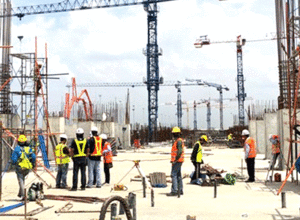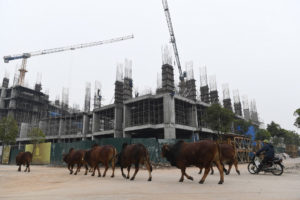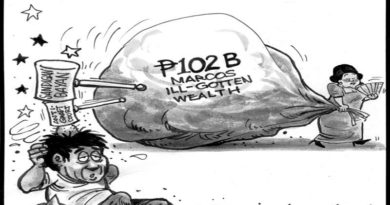REAL ESTATE-MARKETS | Asia-Pacific real estate investment may drop up to 10 percent next year
Real estate investment in Asia-Pacific is projected to drop 5 to 10 percent year on year (yoy) in 2023, following a steep 25 percent yoy decline this year, amid tumultuous economic conditions that are weighing on sentiment. (Shutterstock/Krunja)

Real estate investment in Asia-Pacific is projected to drop 5 to 10 percent year on year (yoy) in 2023, following a steep 25 percent yoy decline this year, amid tumultuous economic conditions that are weighing on sentiment.
According to a study by real estate consultancy JLL, hospitality properties are the only real estate assets likely to book steady growth next year, as capital inflows toward hotels are expected to rise around 6 percent yoy, despite slowing down from this year’s 10 to 15 percent growth thanks to border reopening in many Asia-Pacific countries.
JLL estimates that real estate investors will also look to sectors benefiting from structural tailwinds and higher potential returns, such as data centers, logistics and a slew of scheduled greenfield projects in emerging markets, including India and Southeast Asia.
Japan, meanwhile, is predicted to emerge as the most attractive real estate investment destination thanks to a weakening yen coupled with the country’s low interest rates.
Singapore’s status as a safe haven and its sound property fundamentals will continue to attract investors, while Australia will likely draw core investors because of the country’s highly transparent framework and low beta characteristics.
Read also: Rate hike hits landed housing: Colliers
JLL chief Asia-Pacific research officer Roddy Allan said optimism driven by the idea of the pandemic coming to an end had slowly given way to caution amid concerns about inflation, interest rates and geopolitics.
“While the Asia-Pacific region is likely to fare better due to more resilient domestic demand, it will not be left unscathed from the broader challenges. As a result, there will be increased pressure on policymakers to delicately balance support measures as uncertainty persists,” he explained, as quoted in a press statement released on Wednesday.
In 2023, 74 percent of organizations in Asia-Pacific said they would likely be willing to pay a premium for leasing a building with leading sustainability credentials, and 22 percent said they already had.
With an acute shortage of green and efficient buildings, the study found that property owners who undertook retrofitting projects could benefit from higher rent, reduced financial risk, improved access to capital at favorable rates and better prospects for attracting and retaining tenants.
Read also: Challenges amid recovery for Indonesian property sector in 2023
Opportunities lay in the rental premium for green certified buildings, the study contended, which had emerged due to restricted supply. Industry tenants in Asia-Pacific aspired to have market-recognized sustainability certifications for at least half of their portfolio by 2025.
However, the current supply of green-certified buildings, at 40 percent for Grade A office stock, is insufficient to meet the ambitious net-zero targets set by tenants.
In addition, e-commerce-related demand is expected to remain a key long-term driver for warehouse space, particularly in emerging Asia.
This has fueled a building boom in parts of the region with 25.9 million square meters of new stock expected to come on stream in 2023 to meet the growing needs.
Allan said the overall 2023 outlook for Asia-Pacific real estate was still cloudy as uncertainty persisted. But while the near-term prospects appeared challenging, the situation also presented many opportunities.
“Disruptions to the economy should prove relatively short and shallow, and market participants should be thinking beyond this period to take advantage of opportunities that lie ahead,” he noted.
Jakarta ● Wed, December 28, 2022
Property market sees recovery in Vietnam
 Cows walk past a construction site in Hanoi on January 6, 2021. (AFP/Nhac Nguyen)
Cows walk past a construction site in Hanoi on January 6, 2021. (AFP/Nhac Nguyen)

Vietnam’s Construction Ministry has reported that the domestic real estate market has overcome the most difficult period of the COVID-19 pandemic as a result of positive developments in the market, as well as the whole economy in the fourth quarter of 2020.
The country’s property sector is considered the bright spot of the domestic market with the European Union – Vietnam Free Trade Agreement (EVFTA) coming into effect and plans for the relocation of many multinational corporations to Vietnam, according to the ministry.
Vietnam’s successful disease control is also an important factor in attracting more foreign investment. Those factors will lay a good foundation for the real estate market to develop stably in 2021, a representative of the ministry said.
In the fourth quarter of 2020, most businesses in the real estate sector started operating again
Although the market still faces many difficulties, real estate developers have offered solutions to attract customers, such as changing areas for developing property projects to catch up with trends of shifting foreign direct investment (FDI) inflows and urbanization in localities outside big cities, according to the ministry.
Thanks to product handover activities, project share transfers, asset liquidation and the development of industrial real estate, some real estate businesses have made record profits. Nearly 80 big real estate companies have achieved or exceeded their after-tax profit goals.
The domestic real estate market in the fourth quarter of 2020 recovered significantly compared with the deep reduction in previous quarters of last year following a rebound in the housing and industrial zone segments, helping the property sector maintain positive growth for 2020.
In 2020, the real estate sector contributed about 4.42 percent of national GDP. In 2020, the real estate industry also suffered setbacks. The number of newly established enterprises was 6,694, down 15.5 percent compared with 2019, while 978 enterprises completed dissolution procedures.
According to the Construction Ministry, the total outstanding debt of the real estate sector in 2020 increased quarter by quarter. The debt reached 8.3 trillion dong (US$361 million) in the first quarter and hit 8.5 trillion dong in the second quarter and 8.6 trillion dong in the third quarter. As of Dec. 31, 2020, the debt reached more than 8.8 trillion dong.
Besides banking loans, property companies in 2020 attracted capital from other sources such as individual investment capital, remittances and capital from issuing stocks and bonds.
Regarding the supply and transaction of real estate products, the ministry’s representative said by the end of the first quarter of 2020, apartment
inventories on the market were estimated at nearly 13,000 units.
In the second and third quarters, the negative impact of the COVID-19 pandemic, as well as problems in terms of mechanisms and policies, affected the progress of implementing investment procedures of property projects and also the progress of implementing those projects. So, the market did not have significant growth of new supply in those quarters.
However, the real estate market was still a safe investment channel so apartment inventories reduced to 6,000 units at the end of the third quarter of 2020. Entering the fourth quarter, the market had a new supply of nearly 30,000 apartments and transactions were still quite stable.
The ministry reported that last year, the domestic market had a total inventory of apartments of about 9,000 units nationwide. They are mostly located in Da Nang, Khanh Hoa, Kien Giang and Binh Duong.
Meanwhile, the property market in Hanoi, Ho Chi Minh City, Quảng Ninh and cities with strong urbanization such as Can Tho, Long An and Dong Nai maintained stable development with a moderate level of apartment inventories.
.

Ads by:
Memento Maxima Digital Marketing
@[email protected]
SPACE RESERVE FOR ADVERTISEMENT


 Memento Maxima Digital Marketing
Memento Maxima Digital Marketing






